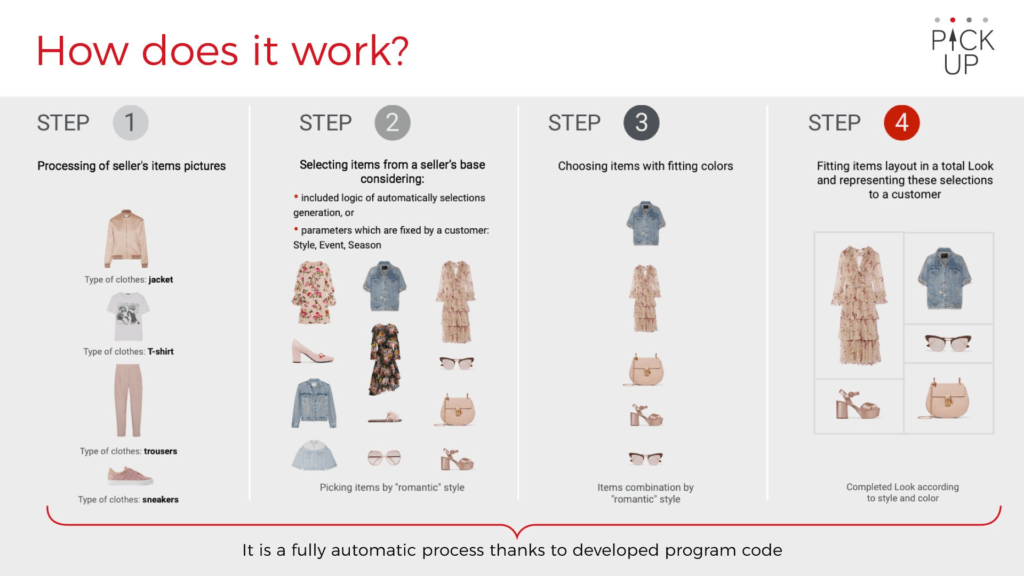Is it time to say “good bye” to stylists as a profession: Kapsula.com.ua and pickup.fashion develop AI-stylist to dress you up.

In 2018 Kapsula, online fashion marketplace, in collaboration with pickup.fashion introduced AI-stylist, which helps customers to generate complete looks within seconds depending on weather, color palette preference, and occasion.
Kapsula is a young and dynamic marketplace start-up from Ukraine, which helps Ukrainian designers to build solid consumer traction. According to Natalia, the key difference between Kapsula and any other fashion marketplace is artificial intelligence (AI) – stylist, which helps customers to create tailor-made set of clothing for different occasions. AI-stylist based its choice on millions of visuals available online of perfectly matched full sets of styles (capsules). By providing variety of capsules for the different occasion AI-stylist reduce the time customers spend otherwise to find clothing, match it, and buy it from different retailers. AI-stylist also pairs clothing better on average than regular customer.1
Founded back in 2015 by Natalya Gordiyenko, then a brand marketing manager in the large consumer goods company and freelance stylist in the spare time, Kapsula sought to revolutionise the way how women choose their wardrobe. According to Natalia, usually women buy clothing by following trends and peace-by-peace, which is very time-consuming process and often disappointing because bought separately clothing is hard to match with overall wardrobe. Helping her clients and friends, Natalia noticed that the key benefit of a personal stylist is ability to create complex wardrobe, mixing different styles, colors, and textures, yet at the end having well-balanced and beautiful look. Further researching the market, Natalia found that no one on the market offers such service to customers.
At the beginning Natalia was creating all capsule-looks by herself, which consumed significant amount of time and distract her from building business as a whole. Natalia mentioned that she spent on average 20 minutes to create one well-balanced capsule-look.2 Keeping in mind that Kapsula.com.ua has hundreds of looks for variety of occasions, moods, and customer preferences, to update the collection every season required weeks of through work. Back in 2017 she also got curious about machine learning and how it could be applied to fashion industry. “At some point, I realised that millions of looks available online and if only AI could analyse it, it could practically help me to create capsules by reducing time spent on research substantially”.2 Partnering with pickup.fashion3 and experimenting with different approaches, Kapsula introduced AI-stylist, which was able to pull capsule look within a second and adjust it according to the needs of a particular customer. Moreover, AI-stylist is constantly learning based on customers preferences and remember all the looks a customer likes or eventually purchases. Kapsula is successfully growing and attracting venture investments to expand abroad.
Artificial intelligence disrupts retail space in general and apparel industry in particular. Of course, AI is not able to fully replace such professions as stylist or creative designer, because substantial amount of work they do is creative in its nature. However, it is easy to imagine that based on thousands of look-books issued by brands every year (initial creative input), machine algorithms are able to generate quite unique and sophisticated looks for customers. Moreover, there are many other ways how AI could be applied in the apparel industry. According to Jack Zhang, analytics group in McKinsey, AI helps “to understand outcomes, such as why customers cancel”4 their orders. Consolidated information on where, when, and how customers placed their orders also help retailers to manage inventory stock and better allocated it by business units in order to ship it faster to the end customers. In general, it is all about spotting different trends in customers behavior and adjust retailer’s operation strategy accordingly.
However, the main challenge still remains – how to obtain reliable data on different aspects of customers life? This problem is relatively easy to solve for such behemoth as Amazon, which receives millions of data points every day from all its customers and practically able to monitor customer behavior online. Such opportunities don not exist for many brick-and-mortar retailers, which apart of understanding in general what their customers like or don’t like and what is the average receipt per day, unable to drive any meaningful insights from their customer base and create machine learning algorithms to serve its customers better. Partly, this problem addressed through creating omni channel distribution strategy (ie creating online store). However, there is a risk that online customers have different needs and preferences and not fully represent the whole customer base. Another way retailer tries to gain more information and apply machine learning algorithms are through online marketing strategy by obtaining customers emails and social media information to derive insights.
It is clear that in a longer-term such strategies are not sustainable and competitive advantage will have retailers who are able to secure large amount of customer information. Hence, the open question is “Will the brick-and-mortar retail inevitably die in the future and online retail be a paramount”?
(779 words)
[1] Shkyl, Lyubomir “Ukrainians teach AI to help customers to build perfect wardrobe. Similar project by Dmitry Sergeev Depositphotos didn’t survived”, MC Today, May 11, 2018. [https://mc.today/ukraintsy-nauchili-iskusstvennyj-intellekt-podbirat-odezhdu-dlya-obraza-podobnyj-proekt-dmitriya-sergeeva-iz-depositphotos-progorel]
[2] Gordiyenko, Natalia. Interview with founder conducted on November 8, 2018.
[3] https://pickup.fashion/ is a B2B fashion artificial intelligence service of clothes, shoes and accessories automatic selection from seller’s online store. It combines items into different fashion looks without stylist’s participation.
[4] “Four experts show how AI solves real-world problems”, McKinsey blog, September 10, 2018. [https://www.mckinsey.com/about-us/new-at-mckinsey-blog/four-experts-show-how-ai-solves-real-world-problems]





Kapsula’s value proposition reminded me that of Gap when it planned to use data/AI to replace traditional designers. It is clear data reveals trend based on an increasing amount of data on the internet. However, when it comes to personalized design, I still think there’s a lot of challenge to be trendy, creative yet individualistic. In the era of fast fashion, one can easily obtain information on what is trendy, but the key is to be trendy yet true to oneself. The key to strike such a balance could be quantity of data, but probably more on the quality of data, e.g data one might get in a brick-and-mortar retailer where salesperson talks to customer and get a sense of what he/she really wants. How to get such data online will be crucial to Kapsula’s success.
I wonder if brick and mortar can actually be enabled by AI learning algorithms. Many brands are, in fact, starting as online brands solely for the purpose of collecting consumer data about trends, preferences and styles. With this data, brands are able to effectively open brick and mortar locations that are optimized for the specific fashion trends and tend to see better outcomes because of the data intensity that was invested into the project. I wonder if Kapsula has thought about monetizing the data they are collecting to benefit the myriad of other brands trying to penetrate the brick and mortar market.